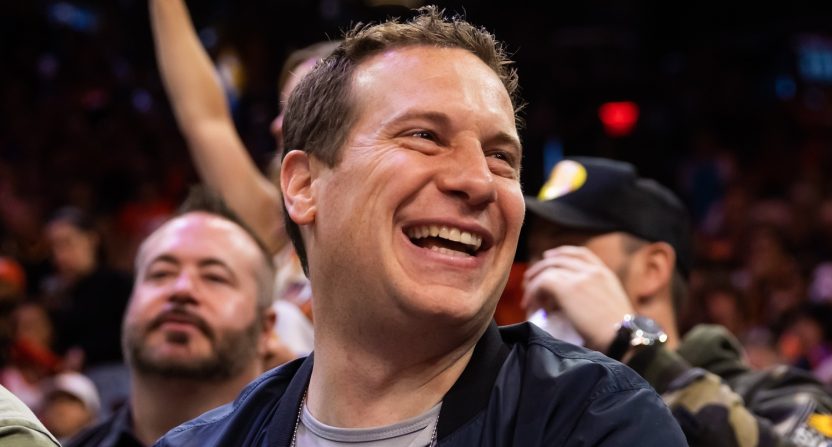Last week saw the news that the Phoenix Suns and Mercury had become the first teams to exit the Diamond Sports Group regional sports networks since Diamond’s bankruptcy filing, leaving Bally Sports Arizona and opting for a new deal with two Gray Television-owned broadcast stations and a streaming deal with Kiswe. Even as that was announced, Diamond pushed back with a threat of legal action, saying they have a contractual right to match that was ignored.
That led to Diamond filing an actual lawsuit Wednesday. But Suns/Mercury owner Mat Ishbia (whose purchase of those teams from former owner Robert Sarver was officially approved in February) said the lawsuit was anticipated, and it won’t stop them. That’s as per Eben Novy-Williams of Sportico:
Here's @Suns owner Mat Ishbia's response to the lawsuit: https://t.co/qYL3iSNAOB pic.twitter.com/RTPDYaEtn2
— Eben Novy-Williams (@novy_williams) May 4, 2023
There are a few things of note with this lawsuit. One is that we don’t know the financial details of what Gray/Kiswe are planning to pay the Suns and Mercury. Much of the speculation is that it would be lower than what Diamond paid, as these broadcast stations have lower retransmission fees than cable RSN Bally Sports Arizona’s cable per-subscriber fee. And Diamond even referenced that in their initial pushback here, saying their right to match was for any offer less than what the team last proposed to them.
However, it’s not yet clear what Gray and Kiswe are offering financially, and how different it is. There are ways that this deal can have a knock-on effect for Gray, including potentially with retrans negotiations for their other stations, with an overall profile and distribution increase for these stations, and with increased advertising revenues from what Diamond was getting now that these games can reach a wider audience. So it’s not inconceivable that their deal is at least in a similar financial ballpark. And it’s also not clear if that contractual right to match is specifically written only in terms of raw dollars, or if there’s room for calculation of other considerations (such as the increased distribution they’ll get from a broadcast TV deal, which Ishbia has repeatedly referenced as the driving factor here, and one he thinks other teams will follow).
What really stands out with these “Nobody is surprised” and “It will not stop” comments from Ishbia is the idea of a potential debate over specific performance. Again, this would depend on how the contract is written and what remedies are prescribed in it. But it’s often quite difficult to force a specific continuation of a deal (in this case, continued Suns and Mercury carriage on Bally Sports Arizona), with many lawsuits instead winding up in either financial settlements or financial awards from the court.
If Ishbia was truly anticipating this lawsuit, he’s likely already thought of that as well. And perhaps he’s thought of that the extent of being willing to pay some level of money to Diamond (whether in a settlement or a court ruling) to get the Gray deal to go through. And with an estimated net worth of $9 billion (as per Bloomberg), he can probably afford to do that. So the lawsuit alone does not mean that Suns and Mercury games will definitely stay on Bally Sports Arizona.
Diamond does have a significant interest in trying to enforce specific performance rather than just financial compensation, though. That’s particularly true considering how there’s already major uncertainty around the future of Bally Sports Arizona (thanks to a missed payment to the Diamondbacks that has them as a creditor in the bankruptcy reorganization, and an attempted renegotiation of that deal). If the network is not able to retain Diamondbacks rights and also loses the Suns and Mercury, that would leave them with just the NHL’s Arizona Coyotes, regularly known for some of the league’s worst local ratings. So that’s probably not a viable RSN. Thus, this lawsuit will be well worth tracking, especially when it comes to if Diamond can retain these rights versus just get some level of payout. (And the clock is ticking, with the first locally-broadcast Mercury game set for May 25.)
[Eben Novy-Williams on Twitter; photo of Ishbia sitting courtside at an April 25 playoff game from Mark J. Rebilas/USA Today Sports]







